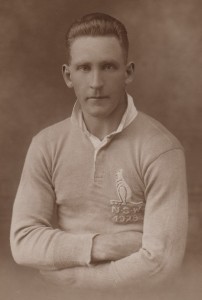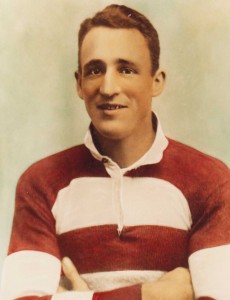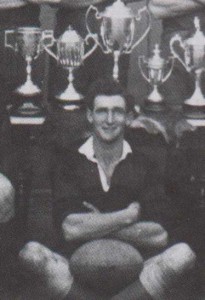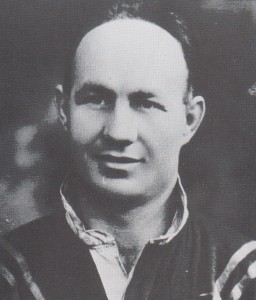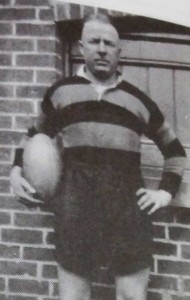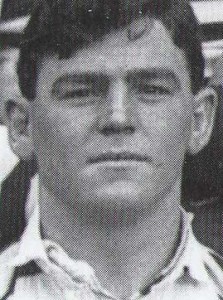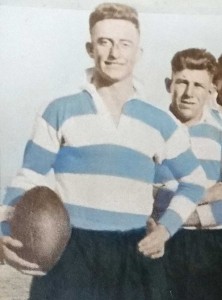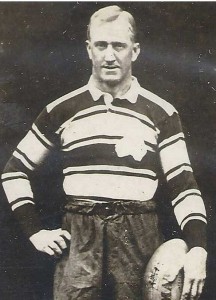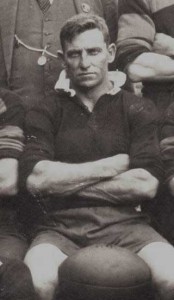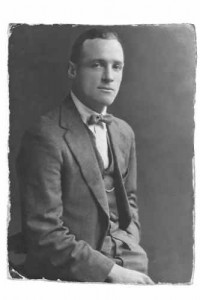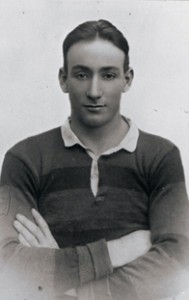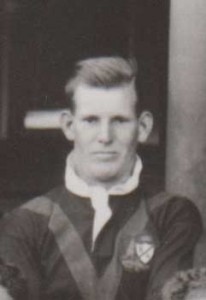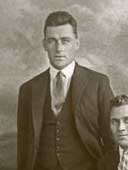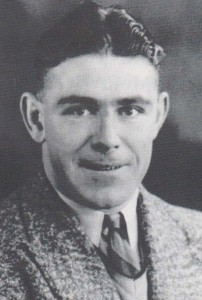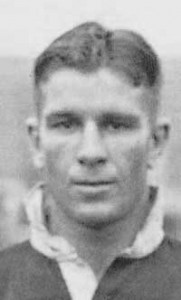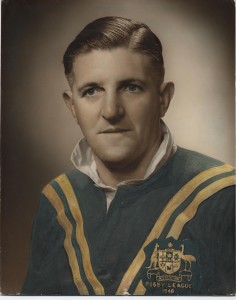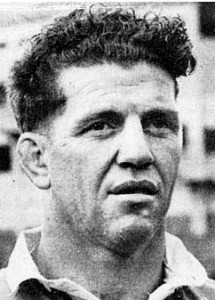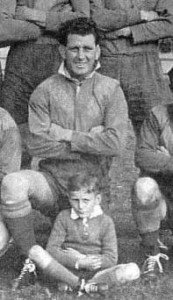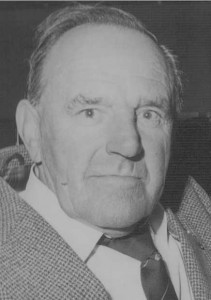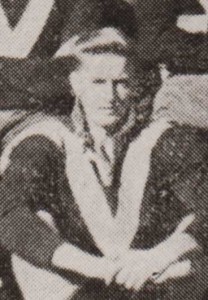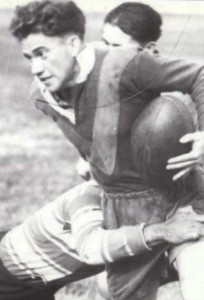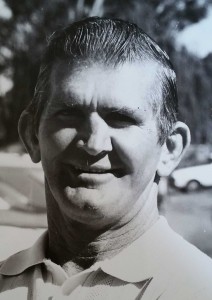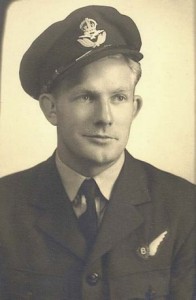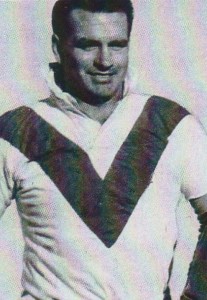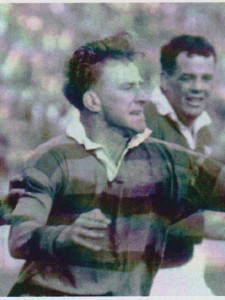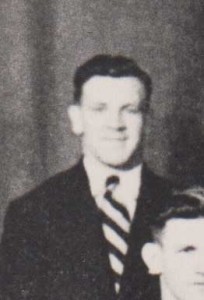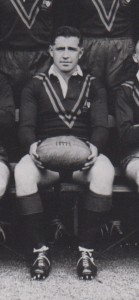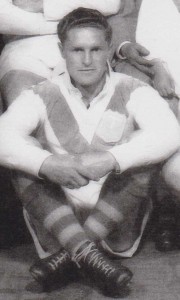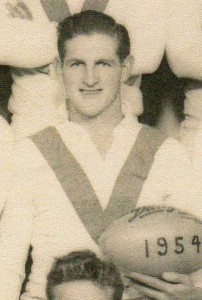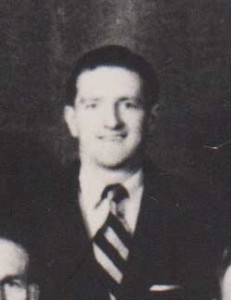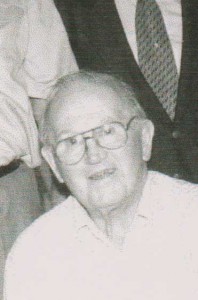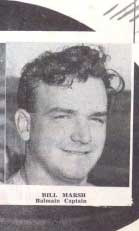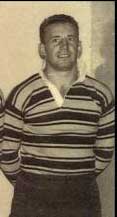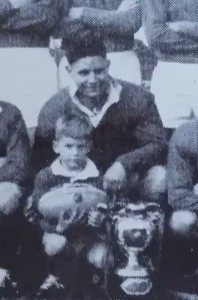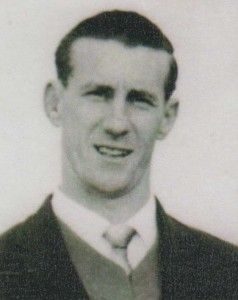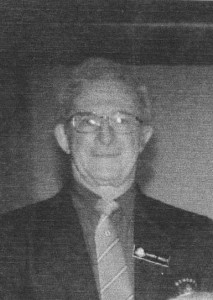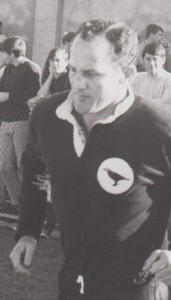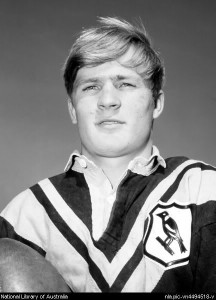In Maher Cup country you may have had to be a football hero to get along with a beautiful girl…as the song goes, but you didn’t need to be an International Australian representative. However 40 men on the Kangaroos Register (13 locals and 27 imports) did both represent the nation and play Maher Cup. In some 314 matches (43% of the total), at least one past, current or future international participated. On 23 September 1925 at West Wyalong four such men took to the field: Bill Brogan and Dick Vest for the home team, and Eric Weissel and Jack Kingston for the challengers. All were locals. It was indicative of the quality in the early days and a hint of why the Cup became such a phenomenon. Having phenomenal players helps.
Most of the internationals who are still revered today in Maher Cup country, such as those above and Bluey Freestone and Ron Crowe were either locals, or when they came from the city they settled for life, like Nevyl Hand and Fred De Belin. The Kangaroos who came to play and coach in the limelight of their careers had mixed results. Some like ‘Chook’ Fraser, John Graves, Clem Kennedy and Peter Diversi swept all before them, others played a single game and left town quietly. Australian captain Joe Jorgenson just went missing.
Cootamundra had the most internationals – eight, although only two of whom (Weissel & Kingston) were locals. Harden was almost international free, with only Laurie Ward playing a single game as a young school teacher years before being selected for the nation. West Wyalong with five locally bred internationals must rank as tops for talent development – Dick Vest, Bill Brogan, Cec Fifield, Bert Williams and Ron Crowe.
| Player | Notes | |
|---|---|---|
| Eric Vivian 'Bluey' Freestone (1904-1957) Gundagai 1922-1928 More: 1928 news story Wikipedia entry | Bluey Freestone, may have been christened Eric, but was referred to as Viv for those seeking a more formal tag than that which reflected his hair colour. A Gundagai native he first played Maher Cup aged 18 filling in for his injured brother Phil. A big fast back he played 17 Cup games including seven straight victories under the tutelage of 'Chook' Fraser. Bluey represented Australia in the first test in 1928 direct from Gundagai. In 1929 he moved to St. George for another 48 matches. | |
| Eric Weissel (1903-1972) Cootamundra 1922-1926; Temora 1927-1934 More: Eric Weissel's Early Years Wikipedia article | Born at Brawlin, a siding just south of Cootamundra, there would be few willing to argue that a better player was ever witnessed on the fields of the Riverina. Playing 62 Maher Cup matches he was on the winning side in 53 of them. Welded to family and community, 'Ec' spent his whole life in the southwest, rejecting many offers from Sydney and English clubs. In 1935 he moved from Temora to be player-coach at Narrandera and then Yenda. In football retirement he coached the Wagga Magpies as well as Group 9 representative teams. In addition to being a contender for the best five-eight of all time we was also top cricket and blessed with a wonderful choir voice. | |
| Dick Vest (1897-1974) West Wyalong 1923-1925 Wikipedia article | Dick Vest, the son of an Austrian migrant was born at Barmedman when it was still a mining town. After his father was killed in a work accident Dick and his brother were shunted off to a boy's home in Sydney. He enjoyed an illustrious career playing for Western Suburbs and Australia before moving back west to captain-coach West Wyalong to many Cups. In 1925 he was part of the first Wyalong side to win the Maher Cup - alongside Bill Brogan, Sid Mansted and a stack of Broad brothers. | |
| Bill Brogan (1900-1983) West Wyalong 1923-1926 Wikipedia article | Born at West Wyalong, Bill was a balding seasoned 23 years old 15 stone front row forward and well known boxer by the time the Mallee Men first challenged for the Maher Cup. He frightened the life out of the English when they came to Cootamundra to play in 1924. A good-natured but tough player with his 'ability to look after himself in furtive encounters', he was no stranger to being sent off nor to the sobriquet 'Big Bad Bill Brogan'. He also played for Western Suburbs as a part of their first premiership winning side in 1930. Later captaining Wests he also spent time coaching up at Warialda and Moree. | |
| Rex Norman (1891-1961) Cowra 1924; Canowindra 1926 & 1928 Wikipedia article | Rex Norman moved west in his thirties after playing for Annandale, Souths and Easts. From a family full of sporting brothers he also represented NSW at cricket. After two years as player-coach at Cowra, he was lured to pretty Canowindra - blessing it with both a top rugby league and cricket coach in the one package. He ably lead Canowindra in numerous defences of its beloved Jack Hore Gold Cup - a trophy that for a time had a similar aura in the central-west to that of the Maher Cup in towns further south. Rex Norman settled in Canowindra for many years working as a barman. | |
| Jack 'Bluey' Watkins (1893-1974) Tumut 1925 Wikipedia article | Not every international player achieved success in their country sojourns. Representing Australia in 1914 and playing for Easts from 1913 to 1924, his year as captain-coach Tumut started well. He was a punishing lock who became known in the Riverina as the Red Perill. However it went sour when Tumut failed to win the Maher Cup from a very hot Cootamundra team. By the end of the season he was subject to criticism and 'even slander'. He returned to Easts for a final season in 1926. | |
| Jack Kingston (1908-1957) Cootamundra 1925-1930, 1932; Young 1931 | A local lad, Charles John Kingston played with Cootamundra before being selected, along with Eric Weissel, for the Kangaroos in 1928. He played at least 51 Maher Cup matches, including three with Young, who he coached in 1931. When considerable acrimony arose in Coota upon their star being poached by their cherry-picking arch enemy, 'Kinky' responded that in Depression-hit Coota he couldn't get a job. He later became a wandering troubadour playing and/or coaching for Leeton, Narrandera, Wests, Werris Creek, Lithgow, Singleton, Goulburn and Quirindi, before settling into the hotel business at Nambucca. | |
| Reg Latta (1897-1970) Wagga 1927. Wikipedia article | 'Whip' or 'Snowy' Latta, who enjoyed a long playing career with Balmain 1916-1930, took a year out to captain-coach Wagga. In a year when internationals were commonplace in Group 9, he lost both Wagga's Maher Cup challenges - against Jack Kingston's Cootamundra, and then 'Chook' Fraser's Gundagai. Having lead Wagga to 15 wins in 19 matches he still received a fond farewell and left a team good enough to snaffle the Cup the next year. 'Whip' returned to Balmain where he continued coaching and became a long-standard club official. | |
| Charles 'Chook' Fraser (1893-1981) Gundagai 1927 Wikipedia article | If there is a contender for the man who made the biggest difference to a local Maher Cup team it would probably be a contest between Phil Regan at Cootamundra and 'Chook' Fraser at Gundagai. A Kangaroo at 18 and a decade later the Australian captain, Fraser was aged 34 and a veteran of 17 years with Balmain when he landed in Gundagai to be the player-coach. He made the Murrumbidgee Boys a force to be reckoned with, when in 1927 they won their first Maher Cup match and held it for six challenges. The next year he suffered a career ending knee injury but continued coaching at Gundagai for a while before a grateful community bid him adieu and confirmed him as a household name for many generations. | |
| Harry Caples (1898-1933) Wagga 1928 Wikipedia article | Harry Caples, with an excellent team gathered from around the Riverina towns, delivered the first Maher Cup victory to Wagga. The Bathurst-born former captain of premiers Eastern Suburbs went on to coach Orange and Robertson before he died suddenly aged 35 from meningitis in 1933. | |
| Alf 'Smacker' Blair (1896-1944) Wagga 1931 Wikipedia article | Notwithstanding the economic Depression Wagga continued to pay big money for big name player coaches. And with 167 games for Souths under his belt they didn't come better credentialed than 'Smacker' Blair. However the team from the city of Wagga lost the first challenge to the team representing the village of Barmedman. The latter was largely composed of local farmers from the Lawrence, Templeman and Cooper families. Wagga then fell to a Temora lead by a man the locals considered to be an even better five-eighth than 'Smacker', Mr. Eric Weissel. | |
| Laurie Ward (1911-1973) Harden 1930 Wikipedia article | Sometimes a player destined for national fame makes a quiet start in a small country town. Lawrence Raymond Ward, born nearby at Goulburn, was appointed school teacher at Murrumburrah in 1930. Through circumstance and injury he only played one Maher Cup match. However his brilliance was widely reported. Dubbed the 'Prince of Sport' around Harden because of exemplary skills in swimming, diving, cricket and football, he was selected as fullback in Group 9 and NSW Country teams. In 1933 he was transferred to Paddington where he became an Australian representative in 1935 with Easts, while memory of him slowly faded in the hyphenated towns. | |
| Cec 'Dick' Fifield (1903-1957) Junee 1930-31 Wikipedia article | Cec Fifield was like many people at the time raised in West Wyalong born around Adelong, a similar mining town which was winding down as rich veins were discovered out around the Bland. Before Wyalong got to compete for the Maher Cup Cec had left his job at Leadbitter's garage and started to play stunning football for Western Suburbs. In 1930 he accepted the offer of a job, coach's salary and board to head out to Junee. While the Maher Cup remained elusive for the railway town team, Junee performed well and enjoyed holding the Jack Hore Gold Cup for many weeks. Fifield's last match in Australia was at Junee before he sailed to England where he played 224 matches for Hull. | |
| Bert Williams (1914-1998) West Wyalong 1932-1935 | Born at Forbes in 1914 Bertram Holman Williams' father moved to West Wyalong as the Wright-Heaton representative when Bert was seven. Young Bert was a big 14 stone centre in the Maher Cup at 18. He was badly injured when he crashed his motor bike in 1933; got knocked out and scored two tries against Junee in a good Cup run under 'Doon' Casey; got selected for Country in 1935; experienced the town's wrath when he celebrated his 21st instead of playing in a Maher Cup match; moved to Bombala in his job with Shell Oil in 1936 and captained Country; was a star on the Australian tour of England in 1937; returned to Wyalong in 1938 and got married; after a posting in Mudgee, moved to his bride's town of Taree where he retired from playing in 1947. They later lived at Coonabarabran and Camden. | |
| Jim Gibbs (1909-1996 Cootamundra 1935 Wikipedia article | From Newcastle, Gibbs one of five footballing brothers, represented Australian in 1933 and played for South Newcastle for more than a decade. He became captain-coach of Coota in 1935 as the club sought to resurrect its reputation by importing five star players. However the local players, in these still Depression days, were not impressed with being unpaid while the imports were cashed up. Gibbs in his second game, 'revealed disappointing form' to lead Coota to defeat against a Tumut team of young unpaid locals. Tumut's talented teenager Tom Kirk's kicking embarrassed the Coota supporters who saw ineptness in the imports. Gibbs along with the other outsiders were sacked. Gibbs later had a successful season at Canterbury. | |
| Edgar Newham (1914-1995) Cowra 1937, 1946 Wikipedia article | A Cowra lad who, after participating in a nine match Cup run in 1937 transferred to Canterbury from 1938. That year the Berries won the premiership. He coached and played during his war service and at the end of 1945 came back to Cowra to captain-coach and seek a place with the Kangaroos. In 1946 he made his debut for Australia aged 32 as well as assisting Cowra to have a great Maher Cup year. He moved back to Canterburyand later become a coal miner and coached teams at Warragamba and Wallerawang before settling in at Camden where he worked as a barman. | |
| Joe Jorgenson (1921-1993) Junee 1947 Wikipedia article | The 1946 Australian captain came to Junee in April 1947 for a record salary and with great fanfare. Junee instantly won their first Maher Cup game in 15 years at Young when 500 Junee folk boarded the special train. Next week they lost to those giant-killers, Barmedman. Just a month later, after there was some mystery as to his whereabouts, Joe returned to the big smoke, blaming his prevarications upon his wife being unhappy with country life. In true Maher Cup style a poem was penned about Joe being 'lost'. | 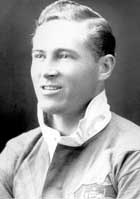 |
| Herb Narvo (1912-1958) Cootamundra 1947Wikipedia article | It was interesting when two former Balmain boys Narvo and Jorgenson opposed each other at Fisher Park. Having the Australian heavyweight boxing champion in the Maher Cup seemed a natural fit. He lead Coota to just one Cup victory. However it was heralded a great year for Cootamundra, when they won first Group 9 premiership and in the process scored 593 for with only 158 points against. Herb is considered him to be one of the greatest coaches to come to the country as well as a convivial mine host of the Cootamundra Hotel. After Herb departed the town continued to enjoy almost a decade of significant success. | |
| George Watt (1917-2010) Boorowa 1947 | A hooker, Watt had won premierships with Balmain. He was with Easts before heading west to coach and rake for Boorowa. He will remain in the memory of the little town for leading them to their first Maher Cup victory in defeating Herb Narvo's Cootamundra. Unfortunately Boorowa did never successfully defend the Cup. Watt moved to Hull in England the next year and settled there for the next 62 years of his life. | |
| Nevyl Hand (1923-2014) Gundagai 1949-1953, 1958 | An import from North Sydney, Nevyl Hand is only rivalled by Eric Weissel and Ron Crowe, as the most 'legendary' Maher Cup player. Although originally unsuccessful as Gundagai's coach he settled in and established a milk run. On his second go the success was indeed fabulous and record breaking. A big man with a big personality, Hand was also great referee, raconteur and possessed a wicked wit. He later lived at Cootamundra. See also this article | |
| Col Donohoe (1929-1986) Barmedman 1950 Wikipedia entry | Matthew Colin Donohoe was East's reserve half-back when he came to Barmedman to captain-coach the locals to Maher Cup glory in 1950. He also represented Riverina and Country while living in the village. Two years later, after returning to Easts, he represented Australia. Donohoe also played for Souths from 1955-1959. | |
| Clem Kennedy (1921-2010) Grenfell 1950 Wikipedia article | Clem Kennedy had represented Souths, Australia, Newtown and Cessnock before he contributed to Grenfell's first ever Maher Cup victory. Still acclaimed locally for transforming Grenfell, for so long the under-achievers, into the 'big name team of Group 9'. They were able to run four Maher Cup victories together to hold the Cup heading into the 1951 season. With Clem injured Grenfell then lost by a point to a West Wyalong where young Ron Crowe was playing his first Maher Cup game. Kennedy returned to Souths where he coached the Presidents Cup team to victory. | |
| Ron Crowe (1932-2013) West Wyalong 1951-1968; Barmedman 1970-71 | 'Dookie' Crowe had to wait 10 years after his Maher Cup debut to represent Australia. Well before that time he was a household name throughout the southwest. A big tough and ultra-fit prop he was also regarded as the exemplary humble country fellow, dedicated to club, family and community. A woodcutter, Ron would use his own needle and thread to repair the inevitable abrasions of his trade. This left us convinced of his toughness, if further evidence was required. The Ron Crowe Oval was named in his honour in 1965, many years before we actually retired from the field. A more complete story is here. | |
| Fred De Belin (1920-2006) Cootamundra 1953-1954 | A Balmain boy De Belin first saw Coota while a youngster at the RAAF training base there in 1941. He spent much of the war over Germany in the precarious role of 'bomb aimer'. Enticed back to Cootamundra in 1950 his stint as player-coach ended in failure, mainly due to the old injuries he carried. However De Belin, like his very good mate Nevyl Hand, was happy to settle down in a small country town. He covered himself in glory three years later in Bernie Purcell's team and again in 1954 under John Graves. A more complete story is here. | |
| Bryan Orrock (1930- ) Boorowa 1953 Wikipedia article | A very successful Souths junior prop, Orrock came out to Boorowa in 1952 with fellow Rabbitoh Ernie Hammerton. When Hammerton went home early Bryan was promoted to captain-coach. However, cashed up with wool at a pound to the pound, there were many quality imports in Group 9 in 1953. Boorowa couldn't compete with the year's big clubs: Young, Gundagai, Cootamundra and Temora. At the end of the season Orrock signed on for St George from where he where represented Australia in 1956 and finished his career two years later. | |
| Ernie Hammerton (1927–1991) Boorowa 1953 Wikipedia article | A Kangaroo in 1951, Souths' hooker came to captain and coach Boorowa in 1953. The town went crazy when they came back from Cowra with the Cup, giving the Lachlan team a 30-4 shellacking. However the next week they lost to Bill Kearney's Young side, so full of imports that there were only one or two spots available for locals. A couple of weeks later Riverina defeated Souths at Redfern 33-12, with Hammerton winning the scrums 42-8. South wanted him back! Hammerton 'did a Houdini' and according to Bede Ryan 'came out on the back sporting pages of The Sun in a Boorowa Green and Gold guernsey training for Souths. In September he raked Souths to a 31-12 grand final victory against St. George | |
| Ian Johnston (1927-2013) Young 1953 Men of League Obituary | Parramatta's first Australian international joined the westward migration. After beating Ernie Hammerton's Boorowa Ian Johnston had the honor of leading Young out at Alfred Oval in front of the biggest Maher Cup crowd of all time. The only problem was that the team of promising imports was defeated 29-8 by Gundagai under Nevyl Hand's steady hand. In his third and final Cup match Young lost to Temora. However Johnston lead Young to the Group 9 premiership, before returning to Parramatta, where had a a dispute and landed up at Coonamble, then Maitland, before returning to Sydney for more football with Wests. | |
| Bernie Purcell (1928–2001) Cootamundra 1953 Wikipedia article | For some reason South's legend Bernie Purcell seems hardly remembered at Cootamundra even though he led the team to ten consecutive Maher Cup victories. One suspects they would have went on with it for quite a while if Harden, after being destroyed 42-9, hadn't won a protest. Harden' complaint was that Coota had fielded a weakened team. Compared with his illustrious career as player and coach at Souths his country sojourn probably pales into some insignificance. | |
| Darcy Henry (1933-2004) Temora 1953 | Temora generally were not big importers of talent, and when they did they tended to go for up-and-coming players. As was twenty year old Darcy Henry from Tamworth. He had been playing for Easts as a teenager before heading out to Temora to help them to six consecutive Maher Cup win. He stayed just one year before moving on to Forbes from where he represented his country. He returned to Sydney in 1956 and played for Wests. | |
| Tom Ryan (1930- ) Temora 1954 Wikipedia article | From Bingara, Tommy Ryan came to Temora through St George. He had represented Australia in 1952. The young captain-coach led a stunning Temora side in 1954. Composed of more locals than just about any Group 9 team that year, they started the season by raking up five Maher Cup victories with a cumulative score of 168-17. They then stumbled to 'Whacka' Graves' Cootamundra. However in a rematch in August they beat Coota 13-11 and held the Cup for the final three weeks of the season. Giving Temora one of its best seasons, Ryan went to Rockhampton the next year and then on to more glory at St. George | |
| John Graves (1926-1983) Cootamundra 1954 Wikipedia article | The was great excitement indeed at Cootamundra when Souths try scoring goal-kicking machine arrived in town. He didn't disappoint. At Temora in front of one of the largest ever Maher Cup crowds, Tom Ryan's brilliant side met an even more brilliant one - which included Kevin Negus at hooker, Fred De Belin and Neil and Roley McDonell. Coota then held the Cup for 9 matches until Temora gained their revenge. However perhaps Coota laughed last when they defeated Temora 21-7 to clinch the Group 9 premiership. | |
| Bob Sullivan (died 2009) Temora 1956 | Sullivan was a 1954 Kangaroo for Norths, who played just one Maher Cup game for Temora - a loss to Young who were led by Leo Trevena. He returned to North Sydney for which he played some 122 first grade games, later becoming club president and patron. | |
| Bill Marsh (1929-2002) Cootamundra 1956 Wikipedia article | After six years playing for Balmain, Bill Marsh become the seventh international to captain-coach Cootamundra. Marsh actually gained his first Kangaroo's guernsey when playing out of Fisher Oval. However Coota were unsuccessful in their two challenges for the Cup - being a draw and a three point loss, both to a West Wyalong side which had enticed three former Cootamundra players - Darrell Fazio, Lionel Wheatley and Algie Metcalf - to play out in the Mallee. | |
| Peter Diversi (1932- ) Gundagai 1956-1957 | Gundagai in it's Maher Cup history had three international imports, 'Chook' Fraser, Nevyl Hand, and Peter Diversi. They chose sparingly but well. Diversi, a bone-crushing lock from Norths had represented Australia in 1954 and arrived in his prime. Young had won eleven Cup matches with an average score of 30-7, and then Diversi's Gundagai come along on 5 May 1956 and prevailed. Diversi stayed on through 1957 when the Tigers won seven more. He then had a further five years with Manly and then went on to Kurri Kurri. | |
| Ron Lynch (1939- ) Young 1958 | Ron 'Thirsty' Lynch, was born in Young and played twelve times for Australia. However he only played once or twice for the Maher Cup, including in a famous 13 all draw at Harden in 1958. He was an apprentice plasterer and moved to Forbes for his work, from where he was selected for NSW and Australia. He is most remembered for his long career at Parramatta playing 194 games and a further 44 at Penrith. | 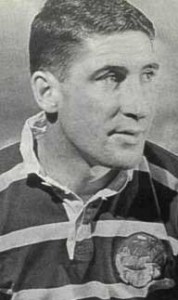 |
| Don Furner (1932- ) Junee 1964 Wikipedia article | Don Furner, a Queenslander, started his illustrious coaching career at Junee, taking the Maher Cup underachievers to three Cup victories. By 1964 the primacy of the Maher Cup was in serious decline and he is probably better remembered in leading the Diesels to their first ever Group 9 premiership. He went on to coach the Queanbeyan Blues, Easts, Canberra Raiders and of course Australia. | |
| Ray Beavan Tumut 1960-61, 1963, 1971 | Beavan was a successful five-eighth at Easts before joining Tumut. A mercurial player, his form could be brilliant or ordinary, he represented Australia from Tumut in 1961. The following year, 1962 saw him captaining Canterbury to win the pre-season competion. Beavan returned to Tumut in 1963, was away to Turvey Park in 1964 and then back again. During the Murrumbidgee Rugby League years Tumut didn't participate in the Maher Cup. However Ray Beavan played in the final Maher Cup match, which Tumut won handsomely in 1971. | |
| Harry Wells (1932- ) Young 1968 Wikipedia article | Wells captain-coached Young in 1967 and 68, some 16 years after he represented Australia from Wollongong. Although he played in just one Maher Cup match, he is still fondly remembered in Young for leading the town to a surprise Group 8/9 competition premiership when they went to Seiffert Oval and defeated a wealthy Queanbeyan team cashed up by Canberra poker-machine addicts. | |
| Arthur Summons (1935- ) Waggie Magpies 1969 Wikipedia article | The third Australian captain to play Maher Cup, he was rare in Maher Cup country, where League had for decades wiped out Union, to have been a convert from that code. Summons had gone west to captain-coach the Wagga Magpies, during the Murrumbidgee Rugby League breakaway years. While his impact at Wagga was substantial in the club competition, in the Maher Cup it was negligible. Magpies made two challenges in 1969, lost both and never ever won the Maher Cup. | |
| Tom Raudonikis (1950- ) Wagga Kangaroos 1969 | Raudonikis was raised at Cowra. While enlisting in the RAAF at Forest Hill he also registered for the Wagga Kangaroos, playing Maher Cup at 19. In the twilight of the trophy he played against Summons whom he would soon emulate by becoming the Australian captain, in 1973. Following the reconciliation with the Murrumbidgee Rugby league there wasn't much aura left surrounding the Old Tin Pot. Wagga, not having the depth of Maher Cup tradition of the smaller towns, decided to forfeit the Cup to Wamoon rather than risk defeat in a competition match the following day. One suspects playing Maher Cup doesn't figure large in 'Tom Terrific's" life. |
